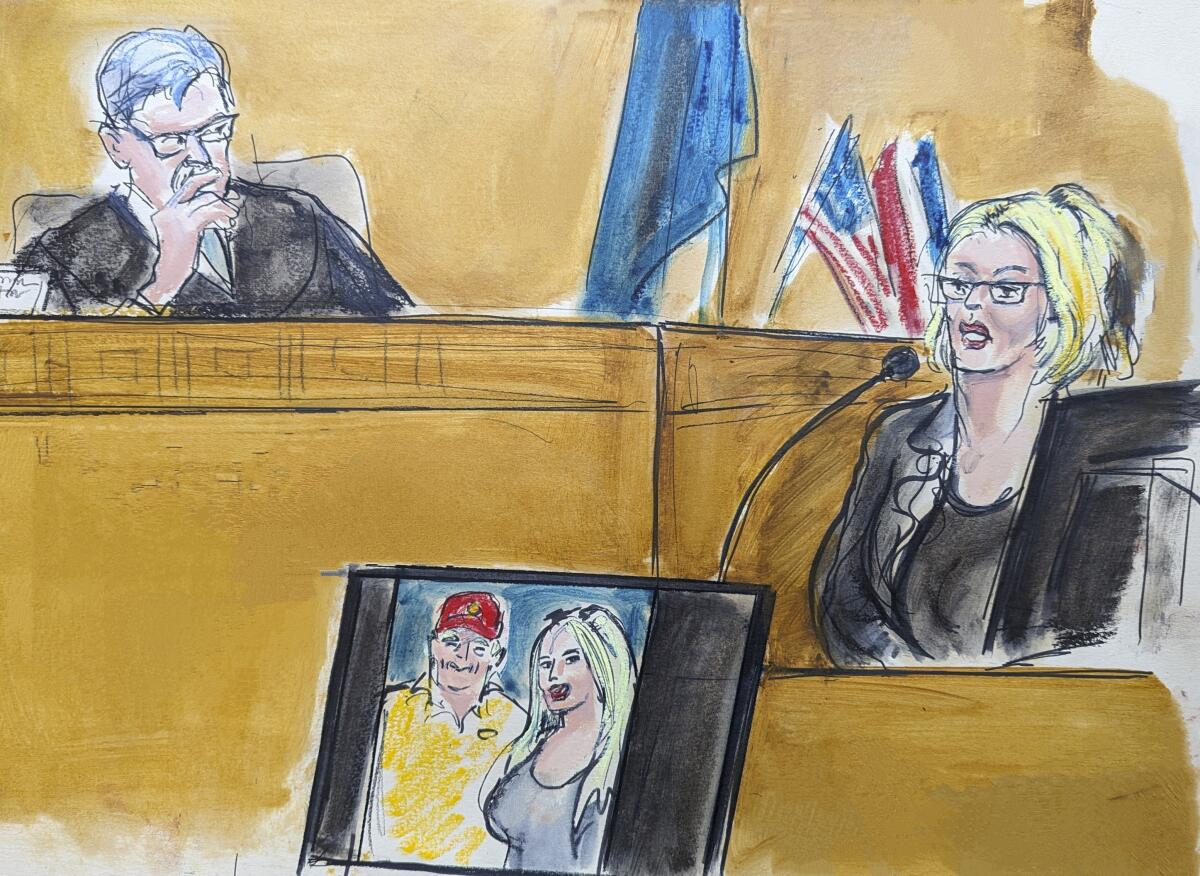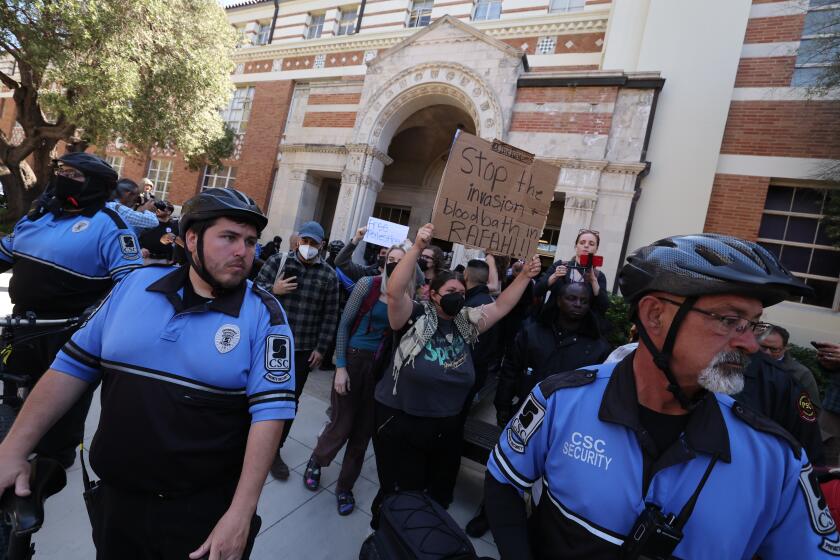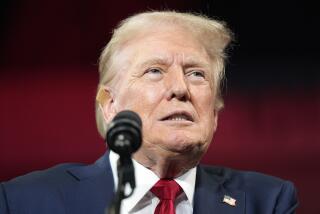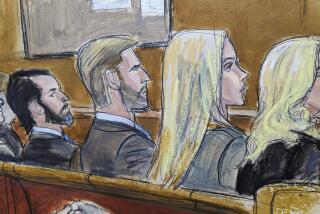Stormy Daniels describes meeting Trump in occasionally graphic testimony

- Share via
NEW YORK — Stormy Daniels took the witness stand Tuesday at former President Trump’s hush money trial, describing for jurors a sexual encounter the porn actor says she had with him in 2006 that resulted in her being paid off to keep silent during the presidential race 10 years later.
Jurors appeared riveted as Daniels offered a detailed and at times graphic account of an encounter Trump has denied. Trump stared straight ahead as Daniels entered the courtroom, later shaking his head and whispering to his lawyers as she testified.
The testimony was the most-awaited spectacle in a trial that has toggled between tabloid-esque elements and dry record-keeping explanation. A courtroom appearance by a porn actor who says she had an intimate encounter with a former American president adds to the long line of historic firsts in the case, which was already laden with tawdry claims of sex, payoffs and cover-ups. It is unfolding as the presumptive Republican nominee makes another bid for the White House.
Daniels was allowed to testify despite the repeated objections of defense lawyers, who demanded for the first time a mistrial over what they said were prejudicial and irrelevant comments.
“This is the kind of testimony that makes it impossible to come back from,” defense lawyer Todd Blanche said. “How can we come back from this in a way that’s fair to President Trump?”
Judge Juan M. Merchan rejected the request and said defense lawyers should have raised more objections during the testimony.
The Trump team later in the day used its opportunity to question Daniels to paint her as motivated by personal animus and profiting off her claims against Trump.
“Am I correct that you hate President Trump?” defense lawyer Susan Necheles asked Daniels.
“Yes,” she acknowledged.
Daniels’ statements are central to the case because in the final weeks of Trump’s 2016 Republican presidential campaign, his then-lawyer and personal fixer, Michael Cohen, paid Daniels $130,000 to keep quiet about what she says was an awkward and unexpected sexual encounter with Trump at a celebrity golf outing in Lake Tahoe in July 2006. Trump has pleaded not guilty.
Led by a prosecutor’s questioning, Daniels described how an initial meeting at a golf tournament, where they discussed the adult film industry, progressed to a “brief” sexual encounter that she said Trump initiated after inviting her to dinner and back to his hotel suite.
Everyone thought they knew Donald Trump. We’ve heard the stories, the blustery asides.
She said she didn’t feel physically or verbally threatened, though she knew his bodyguard was outside the suite, and there was what she perceived as an imbalance of power: Trump “was bigger and blocking the way.”
After it ended, she said, “It was really hard to get my shoes because my hands were shaking so hard.”
“He said, ‘Oh, it was great. Let’s get together again, honey bunch,’” Daniels continued. “I just wanted to leave.”
In the years since the alleged encounter was disclosed, Daniels has emerged as a vocal Trump antagonist, sharing her story in a book and on television and exchanging mocking and pejorative jabs with the ex-president. But there was no precedent for Tuesday’s events, when she came face-to-face with Trump and was asked in an austere courtroom setting to describe her experiences to a jury weighing whether to convict a former American president of felony crimes for the first time in history.
She said she met Trump because the adult film studio she worked for at the time sponsored one of the holes on the golf course. They chatted about the adult film industry and her directing abilities when Trump’s group passed through. The celebrity real estate developer remarked that she must be “the smart one” if she was making films, Daniels recalled.
Later, in an area known as the “gift room,” where celebrity golfers collected gift bags and swag, Trump remembered her as “the smart one” and asked her if she wanted to go to dinner, Daniels said.
Daniels testified that she accepted Trump’s invite because she wanted to get out of a planned dinner with her company colleagues. She said her then-publicist suggested in a phone call that Trump’s invitation was a good excuse to duck the work dinner and would “make a great story” and perhaps help her career.
“What could possibly go wrong?” she recalled the publicist saying.
She said the two saw each other periodically in the ensuing years, when she said she spurned Trump’s advances. She testified that she learned from her agent in 2011, several years after she and Trump were last in touch, that the story had made its way to a magazine.
She said she agreed to an interview for $15,000 because “I’d rather make the money than somebody make money off of me, and at least I could control the narrative.” The story never ran, but later that year, she was alarmed when an item turned up on a website.
Perhaps seeking to preempt defense claims that she was in urgent need of a massive payout, Daniels testified that she was in the best financial shape of her life, directing 10 films a year, when she authorized her manager to shop her story during the 2016 presidential election cycle. She said she had no intent of approaching Cohen or Trump to have them pay her for her story.
“My motivation wasn’t money,” she said. “It was to get the story out.”
Necheles, the defense lawyer, zeroed in on that point, pressing Daniels on the fact that she owes Trump hundreds of thousands of dollars in legal fees stemming from an unsuccessful defamation lawsuit and that she tweeted in 2022 that she “will go to jail before I pay a penny.”
“That was me saying, ‘I will not pay for telling the truth,’” Daniels testified.
After multiple discussions with the judge and Trump’s lawyers out of the earshot of jurors, prosecutor Susan Hoffinger navigated her questioning about the encounter with caution, instructing Daniels to keep her answers brief and free of extra details. Merchan repeatedly shot down Daniels’ attempts to describe the encounter more vividly, striking several of her answers from the official court record.
Testimony so far has made clear that at the time of the payment to Daniels, Trump and his campaign were reeling from the Oct. 7, 2016, publication of the 2005 “Access Hollywood” video in which he boasted about grabbing women’s genitals without their permission.
The candidate spoke with Cohen and Hope Hicks, his campaign press secretary, the next day as they sought to limit damage from the tape and keep his alleged affairs out of the press, according to testimony.
Cohen paid Daniels after her lawyer at the time, Keith Davidson, indicated she was willing to make on-the-record statements to the National Enquirer or on television confirming a sexual encounter with Trump. National Enquirer editor Dylan Howard alerted publisher David Pecker and then, at Pecker’s direction, told Cohen that Daniels was agitating to go public with her claims, prosecutors said. Daniels had previously sought to sell her story to another celebrity gossip magazine, Life & Style, in 2011.
Daniels testified that she ended up with about $96,000 of the $130,000 payment, after her lawyer and agent got their cuts.
She also said she was steadfast in abiding by her nondisclosure agreement with Cohen, declining to comment to the Wall Street Journal for a November 2016 story that reported she had been in discussions to tell her story on “Good Morning America” but that nothing had come of it. She also declined when the newspaper asked her for comment before it broke the news of her hush money arrangement in 2018.
After that story was published, her life turned into “chaos,” she testified.
“I was front and foremost everywhere,” she recalled.
Campus protests are feeding the right-wing campaign against American education, and fueling a false fear that law and order need to be restored.
Prosecutors are continuing to build toward their star witness, Cohen, who pleaded guilty to federal charges related to the hush money payments. He is expected to undergo a bruising cross-examination from defense attorneys seeking to undermine his credibility with jurors.
Trump is charged with 34 felony counts of falsifying business records in connection with the hush money payments but has pleaded not guilty and denied any wrongdoing. The trial is the first of his four criminal cases to come before a jury.
Trump’s appearance in court Tuesday, like all other days he’s in the courtroom, meant he could not be out on the campaign trail as he runs for president a third time — a frequent source of his complaints.
Sisak, Peltz, Tucker and Offenhartz write for the Associated Press.
More to Read
Get the L.A. Times Politics newsletter
Deeply reported insights into legislation, politics and policy from Sacramento, Washington and beyond. In your inbox three times per week.
You may occasionally receive promotional content from the Los Angeles Times.











